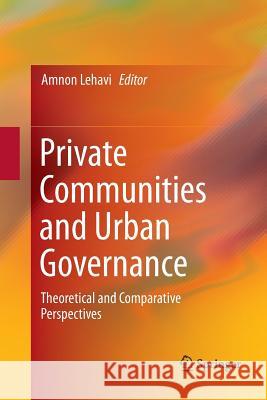Private Communities and Urban Governance: Theoretical and Comparative Perspectives » książka
topmenu
Private Communities and Urban Governance: Theoretical and Comparative Perspectives
ISBN-13: 9783319814551 / Angielski / Miękka / 2018 / 261 str.
Kategorie:
Kategorie BISAC:
Wydawca:
Springer
Język:
Angielski
ISBN-13:
9783319814551
Rok wydania:
2018
Wydanie:
Softcover Repri
Ilość stron:
261
Waga:
0.38 kg
Wymiary:
23.39 x 15.6 x 1.45
Oprawa:
Miękka
Wolumenów:
01
Dodatkowe informacje:
Wydanie ilustrowane











